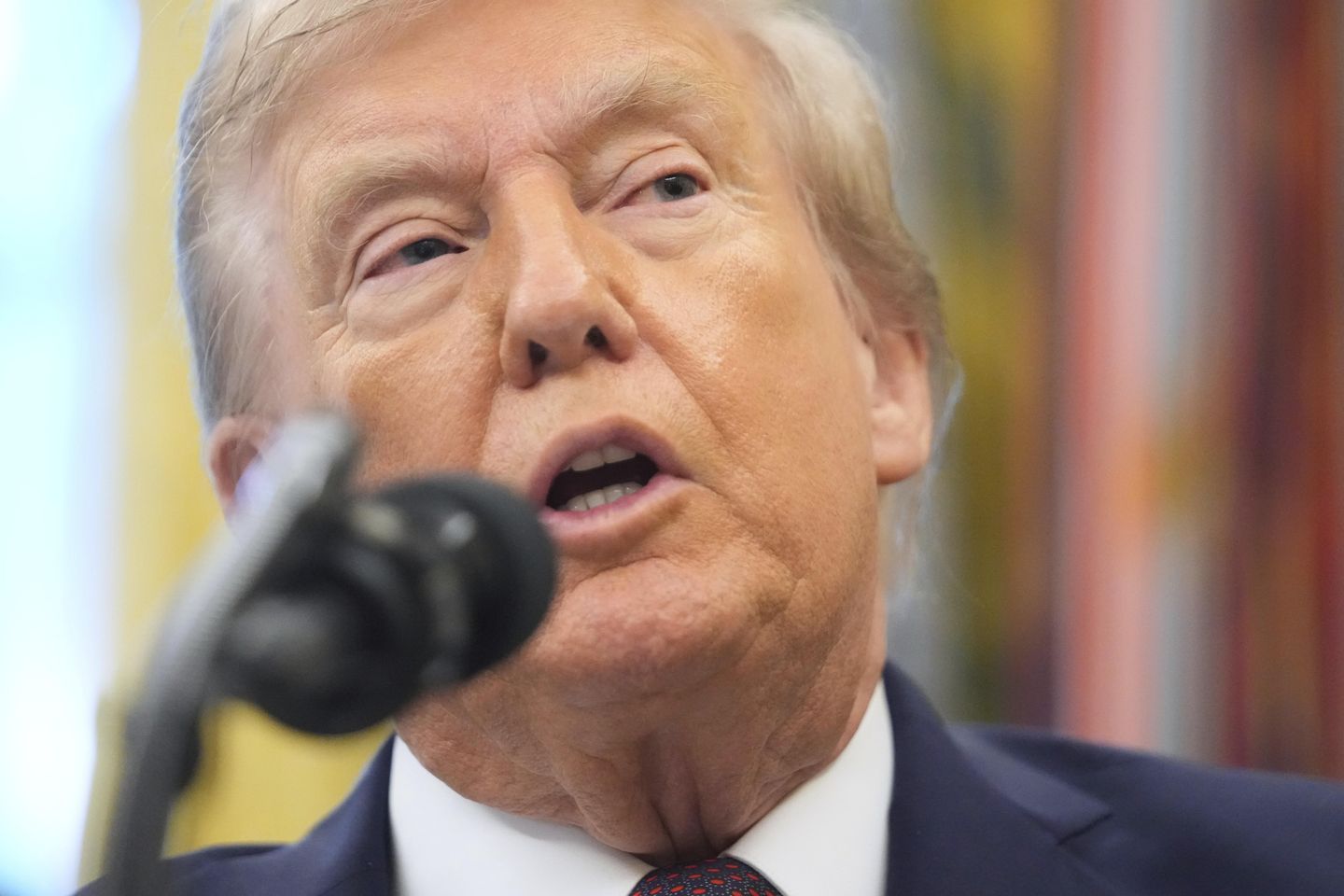
The U.S. military carried out a strike that “shot out” a ship operated by “narcoterrorists” in international waters carrying drugs from Venezuela, President Trump said Tuesday.
Mr. Trump said the ship was being operated by Tren de Aragua, the Venezuela-based gang that the U.S. has declared a terrorist organization. The president said 11 members of the gang were killed in the operation.
“The strike occurred while the terrorists were at sea in International waters transporting illegal narcotics, heading to the United States,” he wrote on social media. “Please let this serve as notice to anybody even thinking about bringing drugs into the United States of America. BEWARE!”
Secretary of State Marco Rubio said the military struck the ship “in the southern Caribbean.”
It marks the latest escalation for Mr. Trump against Tren de Aragua and the broader world of drug-smuggling cartels.
His administration has declared Tren de Aragua, MS-13 and a half-dozen Mexican cartels as foreign terrorist organizations, and he has unleashed unprecedented resources to try to bring them to heel.
Last month, he signed a secret order directing the military to become more involved in the fight.
In an interview at the time, Mr. Rubio said the extra resources were a recognition of the severity of the threat.
“We have to start treating them as armed terrorist organizations, not simply drug-dealing organizations,” he said.
The Navy has deployed the destroyer U.S.S. Sampson and the cruiser U.S.S. Lake Erie to operate off the coast of South America, and two Aegis guided missile destroyers, the U.S.S. Gravely and the U.S.S. Jason Dunham, operate in the Caribbean.
Venezuela had yet to comment on Tuesday’s strike, but President Nicolas Maduro has made clear he is not happy with America’s new power projection.
On Monday, he said he “would constitutionally declare a republic in arms” if U.S. forces attacked his country.
He has deployed troops along his coast and Venezuela’s border with Colombia. The government has also called for enlistments into its civilian militia.
“In the face of this maximum military pressure, we have declared maximum preparedness for the defense of Venezuela,” Mr. Maduro said.
He called the increased military presence “an extravagant, unjustifiable, immoral and absolutely criminal and bloody threat.”
Venezuelan Defense Minister Vladimir Padrino Lopez said the country is ready to confront “any attack” from the U.S.
The U.S. has not indicated any plans to attack Venezuela, though it has argued in court that Tren de Aragua operates in concert with the Maduro regime. Some experts dispute that, saying the gang and the government are opposed to each other.
Mr. Maduro was indicted in a U.S. court in 2020 on charges of narco-terrorism and drug smuggling.
On Monday, Venezuelan Foreign Affairs Minister Yvan Gil said the nearby deployment of U.S. naval forces to combat narcotics trafficking is built on a “false narrative.” He said nearly 90% of the cocaine produced in Colombia is smuggled through a Pacific Ocean route.
He warned that an attack on Venezuela would destabilize the entire region.
“Let us immediately demand an end to this deployment, which has no other reason than to threaten a sovereign people,” Mr. Gil said during a virtual meeting of officials from Latin America and the Caribbean.
Mexican President Claudia Sheinbaum and Colombian President Gustavo Petro have been vocally against foreign interference in Venezuela. They said it could escalate tensions.
“I told Trump, through his emissaries, that it would be the worst mistake,” Mr. Gustavo said of U.S. intervention in Venezuela, The City Paper Bogota reported last month. “And it is not, as the press says, that we are allies of Maduro. My term will pass, so too that of Maduro’s, whatever the year. My time is set by the Constitution.”
Rep. Carlos Gimenez, Florida Republican, applauded the military action at sea.
“Things are escalating there,” he said on CNN. “The president of the United States is trying to protect American citizens. Thousands of Americans have died of overdoses with drugs supplied by that cartel and other cartels.”
The U.S. military’s history of operating against criminal elements can be traced back to the country’s early days and was even immortalized in the U.S. Marine Corps hymn. “To the shores of Tripoli” refers to the 1805 First Barbary War, when Marine Lt. Presley O’Bannon marched across the desert to capture the city of Derna in what is now Libya. It helped end the war against the Barbary pirates seizing U.S. ships.
More recently, the U.S. Navy has campaigned against modern-day pirates off the Horn of Africa in the Red Sea and the Gulf of Aden. It is a critical shipping route where merchant ships are targeted for valuable cargo and crew for ransom. The pirate attacks are often carried out with weapons such as AK-47s and rocket-propelled grenade launchers.
Since the rise of modern piracy, the U.S. Navy and other countries have regularly conducted VBSS, an acronym for visit, board, search and seizure missions. It refers to the armed boarding of a suspicious vessel to inspect for contraband, weapons or other illegal activities such as smuggling.
In April 2009, four pirates from the Somali Basin seized the U.S.-flagged cargo ship Maersk Alabama. The siege ended on April 12 when U.S. Navy SEAL snipers killed the pirates and rescued the ship’s captain, Richard Phillips, who was being held hostage in the vessel’s lifeboat. The incident was portrayed in the movie “Captain Phillips.”





![ICE Arrests Illegal Alien Influencer During Her Livestream in Los Angeles: ‘You Bet We Did’ [WATCH]](https://www.right2024.com/wp-content/uploads/2025/08/ICE-Arrests-Illegal-Alien-Influencer-During-Her-Livestream-in-Los-350x250.jpg)
![Gavin Newsom Threatens to 'Punch These Sons of B*thces in the Mouth' [WATCH]](https://www.right2024.com/wp-content/uploads/2025/08/Gavin-Newsom-Threatens-to-Punch-These-Sons-of-Bthces-in-350x250.jpg)







